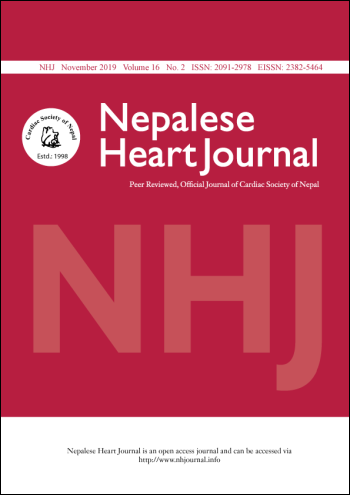Rheumatic Heart Disease in school going children: A cross-sectional epidemiological profile of Jajarkot, Nepal
DOI:
https://doi.org/10.3126/njh.v16i2.26293Keywords:
Epidemiological study, Jajarkot, Rheumatic Heart DiseaseAbstract
Background and Aims: Rheumatic Heart Disease (RHD) is the most common heart disease among children and young adults in Nepal. Identifying the prevalence of RHD is important in planning RHD prevention program. There are few studies on RHD conducted among children of unreached population of Nepal. This study aimed to determine the epidemiological status of RHD among school going children living in rural and underdeveloped community of Jajarkot, Nepal.
Methods: This is a cross-sectional study of 6,147 school going children of age group 5 to 16 years from 24 randomly selected schools of Jajarkot in the month of May, 2018. A team of cardiologists from Nepal Heart Foundation examined the children. Diagnosis of RHD was confirmed by echocardiography. Selected socio-demographic data were collected. All positive cases were reviewed by senior cardiologist. Information obtained were analyzed. Frequency and percentage for the categorical data were calculated. Prevalence was reported as cases per thousand school children.
Results: The overall prevalence of RHD was 7.32 per 1000 schoolchildren. Borderline RHD was 1.30 per 1000 and definite RHD 6.02 per 1000. On severity scale, mild RHD was 6.18, moderate RHD 0.81 and severe RHD 0.33 per 1000 respectively. Prevalence of RHD varied with age, sex, ethnicity, and severity. RHD was found higher among males, 10-16 years age group and underprivileged children.
Conclusion: Jajarkot is found to be a RHD endemic zone in Nepal where prevention efforts should be initiated urgently.
Downloads
Downloads
Published
How to Cite
Issue
Section
License
This license enables reusers to distribute, remix, adapt, and build upon the material in any medium or format, so long as attribution is given to the creator. The license allows for commercial use.




